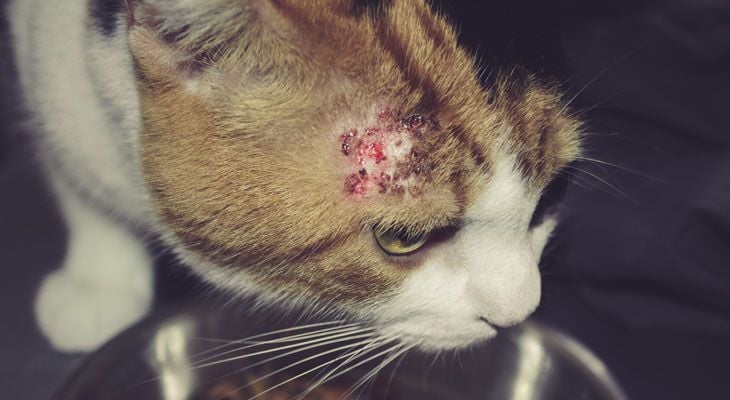
A small number of cats develop various skin conditions, sometimes more than one condition at the same time. Skin conditions can affect a cat’s appearance, as well as increase its risk of more serious skin infections.
Causes of Skin Conditions
Several factors can affect a cat’s skin, along with related parts of its body such as the claws, hair and the glands in the skin that lubricate the hair and skin. These factors include:
- Allergies to food, mosquito or flea bites or particles in the air
- Certain parasites, such as fleas or ticks
- Bacterial infections, including Methicillin-Resistant Staphylococcus Aureus (MRSA)
- Abscesses
- Injuries from fighting cats or other animals
- Over-grooming
- Skin diseases that affect certain breeds
Symptoms of Skin Conditions
The symptoms that a cat shows depend upon the underlying skin condition, but can include:
- Excessive licking, scratching or chewing of the fur
- Redness or discoloration of the skin
- Hair loss
- Flaky, scaly or scabby skin
- Bumps or swelling on the skin
Diagnosing and Treating Skin Conditions
Determining the cause of a skin problem will help your feline veterinarian choose the best treatment. However, it is not always possible to find that cause. To diagnose a skin condition, your veterinarian will rely on:
- History of the cat’s symptoms and other illnesses
- Physical examination
- Laboratory tests
- Cat’s response to dietary or lifestyle changes or to treatments
Treatments for skin conditions in cats may include:
- Flea control products, for a flea infestation
- Changing the diet, for a food allergy
- Draining the pus with a needle and giving the cat antibiotics to fight the infection, for an abscess
- Anti-fungal medications, for fungal infections
- Medications or creams to prevent inflammation and scratching, for inflammation of the skin (dermatitis)
Some skin conditions can be passed between cats, so your veterinarian may also recommend that you keep your cat isolated until it is better.
Challenges of Skin Allergies
One of the most challenging skin conditions to diagnose is skin allergies. Cats can have allergic reactions to food, medications or things in its environment. Some cats may also be more likely to develop skin allergies than others, especially certain purebred breeds.
While veterinarians can treat the symptoms of these conditions—such as with steroids—if the cat is not kept away from whatever it is allergic to (i.e., an allergen), it will continue to have skin problems.
Identifying the cause of a cat’s allergy is not always easy. Cats often eat packaged food that contains a mix of ingredients or may occasionally eat “people” food, so it is not always possible to know which food is causing a problem. In addition, it may be difficult to tie something in a cat’s environment to its allergy, unless you see the allergic reaction shortly after it occurs.
In addition to treating a cat’s symptoms, the feline veterinarian may recommend an overhaul of the cat’s diet. Healthy fats, such as omega-3 and omega-6 fatty acids, which are found in foods like fish and certain plants, may relieve your cat’s symptoms. Your veterinarian can offer more advice on improving your cat’s diet.
If dietary changes do not clear up your cat’s symptoms, your veterinarian may use blood tests or allergy testing done under the skin (intradermal) to identify the cause of the allergy. If you and your vet can identify the allergen, you may be able to keep it out of your cat’s environment.
Eosinophilic Granuloma Complex
One special skin condition in cats is called an eosinophilic granuloma complex (EGC). This can show up as skin eruptions in many places on a cat’s body. These may leak pus or fluid, appear as holes in the skin (ulcers) or look like tumors. Cats may also have allergic symptoms, such as itching, inflammation or swelling.
Often, this condition is caused by the immune system responding to a parasitic infection that does not actually exist. Instead, the body may be reacting to bites from fleas, mites or mosquitoes. In response to the bites, specialized immune cells (eosinophils) release chemicals that cause inflammation of the skin.
Eosinophilic granuloma complex may also be caused by reactions to foods, particles in the air, antibiotics or heart medications.
Some lesions will go away on their own. Other times, a cat may scratch at them so much that they become infected. Depending on where the lesion is on the body, a cat can create an open wound in the skin within hours just by scratching.
Diagnosis of eosinophilic granuloma complex is done similar to other skin conditions. A biopsy may also be needed. This involves removing a small piece of tissue from one or more of the lesions.
Treatment for eosinophilic granuloma complex may include:
- Certain medications, such as steroids
- Antibiotics to treat infections of the lesions
To reduce your cat’s risk of developing these kinds of lesions, keep him or her indoors when the mosquitoes are out, use appropriate flea control and monitor your cat’s reactions to its food. If your cat is exhibiting symptoms of a skin condition, contact us to make an appointment.
